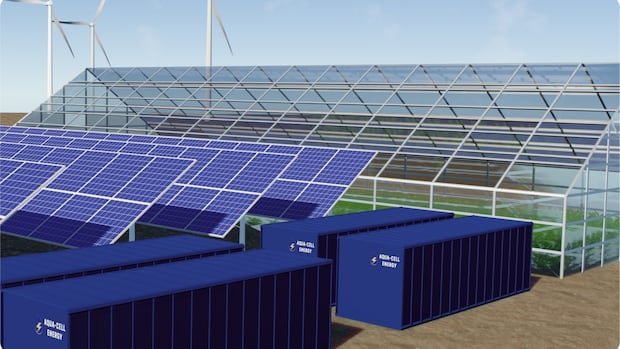An innovative startup from Edmonton is set to trial groundbreaking battery technology in Medicine Hat, aiming to offer a cost-effective alternative to extensive electrical grid upgrades. Aqua-Cell Energy’s saltwater flow battery, housed in a shipping container-sized unit, has been selected as one of the winners in a competitive innovation challenge organized by Medicine Hat.
Comparing grid batteries to vehicle components, Aqua-Cell Energy’s CEO, Keith Cleland, explained that they can be tailored to optimize power output or storage duration. Cleland, originally from Calgary, delved into saltwater battery research during his undergraduate studies at the University of Waterloo. His exploration evolved into Aqua-Cell Energy, established in collaboration with Ellsworth Bell through Waterloo’s startup incubator Velocity.
Upon returning to Alberta, Cleland partnered with the Northern Alberta Institute of Technology to enhance and validate his research. As the company progresses towards larger-scale testing, Cleland envisions contributing to Alberta’s energy landscape by introducing clean energy solutions to fortify electric grids.
The Energy Innovation Challenge initiated by the City of Medicine Hat aims to bolster the clean energy transition and diversify Alberta’s energy sector. With a budget of $2.4 million, the program supports six pilot projects by funding 50% of their costs over three years. Various entities, including Prairies Economic Development Canada, Decentralized Energy Canada, and Emissions Reduction Alberta, back the initiative.
Medicine Hat stands out as the sole Canadian city owning its energy production and distribution, operating independently from Alberta’s provincial power grid within a micro-grid system. Raymond Chokelal, a senior electrical engineer in the city, views this setup as an ideal test environment for Aqua-Cell’s saltwater battery pilot, emphasizing its potential to alleviate grid congestion and enhance stability.
Given the financial challenges faced by Medicine Hat’s energy sector, particularly with aging infrastructure and rising costs, innovative solutions like Aqua-Cell’s battery could offer a reprieve. By postponing the necessity for grid upgrades through non-wires solutions, the battery promises cost savings for the city and its inhabitants.
Looking ahead, Anouk Kendall, president of Decentralised Energy Canada, underscores the significance of supporting entrepreneurs like Cleland to enhance energy grid resilience nationwide. Aligning with Medicine Hat’s renewable energy ambitions, Aqua-Cell’s saltwater battery complements the city’s transition towards sustainable energy practices and regulatory compliance, potentially leading to reduced electricity expenses for consumers.


